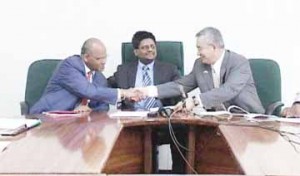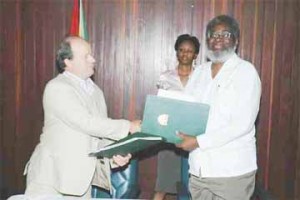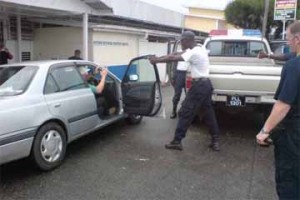Was Guyana a safer place in 2008? The answer depends on how the impact of the momentous events that occurred during the year is measured. Presenting the security sector’s performance review in the traditional end-of-year press conference last December, Minister of Home Affairs Mr Clement Rohee attempted such an assessment.

In some measure, the minister’s review was only partial. He did not refer to many of the salient comments contained in the trio of annual US Department of State reports – International Narcotics Control Strategy; Human Rights Practices; and Trafficking in Persons – that are concerned with human security and public safety. The minister’s review also ignored the derailed IDB-funded Citizens’ Security Programme; the stalled DfID-funded Security Sector Reform Action Plan 2007-2011, and Guyana’s own aborted National Drug Strategy Master Plan. Any review of security without commenting on these reports and programmes would be incomplete.
Public safety
Crime statistics were not cited at the year-end review but those which the Guyana Police Force made available in mid-November confirmed that the public safety situation had deteriorated in 2008. The lethal use of illegal firearms, gang-related assaults and organised narcotics-trafficking pushed the rate for general crime up by thirty-six per cent and for serious crimes up by nine per cent, above the levels for 2007. The massacres in Lusignan, Bartica and Lindo Creek − in all of which 31 persons were killed − not only cast a dark shadow over the entire country but also inflated the annual murder rate.
Up to mid-November, there were about two armed robberies on average every day and an average of about three murders per week, one in four of these being an ‘execution-murder.’ Handguns accounted for two out of five murders. By mid-November, the police had recovered 126 illegal firearms. The worst effects of the surge in serious crime have been the more than three dozen murders, mostly in the near hinterland.

The administration resorted to legislation in response to the surge in serious crime. Several new laws − Evidence (Amendment) Act; Criminal Law Procedure Amendment Act; Criminal Procedure (Plea Bargaining and Plea Agreement) Act; and Interception of Telecommunication Act − were passed by the National Assembly in the face of opposition by the People’s National Congress Reform and Alliance for Change.
The question is whether these new laws will improve public safety. Over the years, particularly since the troubles on the East Coast began in 2002, several laws − Criminal Law (Offences) (Amendment) Act; Prevention of Crimes (Amendment) Act; Racial Hostility (Amendment) Act; Evidence (Amendment) − and others have been enacted. There has been little enforcement, however, and their impact on human security is still to be seen.

Human security
Concern for human security − involving protecting vital freedoms and protecting people from critical and pervasive threats − was paramount in the public mind during 2008 with good reason. In the aftermath of the January and February atrocities at Lusignan and Bartica, citizens of all political persuasions, social classes and religious beliefs committed themselves to the national stakeholders’ consultations called by the president to discuss violent crime. The consultations produced a draft agreement that could have been the basis for building a broad-based consensus against violent crime. Soon afterwards, however, the administration lost its taste for consultation. Its interest in implementing the agreed provisions and in fulfilling its promises to establish the structures of security oversight requested by the stakeholders also seemed to peter out.
Other grave threats to human security were reported in the allegations of torture against the Guyana Defence Force, Guyana Police Force and Guyana Prison Service which are still to be investigated by an impartial commission. Since September 2007, two residents of East Coast Demerara villages appeared before the media displaying injuries which they claim were inflicted after they were arrested by members of the police and defence forces. They said that they had been taken to certain police stations and military camps where they were badly beaten before being released without explanation or compensation.

Yet another violation was the arbitrary arrest of dozens of innocent youths by the police just prior to the People’s Progressive Party’s congress at Diamond Village. For four days, armed special squad policemen swarmed five East Bank Demerara villages – Agricola, Bagotville, Eccles, Houston and McDoom – and conducted a systematic arrest of nearly six dozen young persons. The victims were taken away by the police to be photographed, fingerprinted and to have their personal details recorded, although they had never committed an offence. Eventually, they were all released without apology, explanation or compensation.
This country maintained its odious position on the US Department of State’s Tier 2 Watch List for a second consecutive year for “failing to provide evidence of increasing efforts to combat trafficking, particularly in the area of law enforcement actions against trafficking offenders.” Despite the establishment of a Trafficking in Persons Task Force by the Guyana Government, the United State’s Department of State’s Office to Monitor and Combat Trafficking in Persons annual Trafficking in Persons Report continued to crtiticise this country for being “a source, transit, and destination country for men, women, and children trafficked for the purposes of commercial sexual exploitation and forced labor.”
Minister of Home Affairs Mr Clement Rohee made no mention of the difficulties in implementing the community action component of the Inter-American Development Bank-funded Citizens’ Security Programme; the Crime Stoppers Programme and the Neighbourhood Policing Programme. He did refer, however, to the proliferation of Community Policing Groups and reckoned that there are over 250 of them now functioning compared to 190 at the end of 2007.
Community policing can be a useful instrument in crime prevention. The policy of exercising direct political control over community policing groups through the Ministry of Home Affairs, rather than managing them professionally through police headquarters, however, has contributed to the strained relations between the policing groups and the police divisions and to limiting their contribution to public safety. Worse, it has transformed a serious policing concept into a security sideshow, a plaything in the hands of politicians who lavish the groups with oodles of gifts while the police divisions hunger for similar resources.
Border security
Securing this country’s long land frontiers and maritime boundaries has always been problematic. Not securing them is idiotic. Yet, the Ministry of Home Affairs seems to rely on the illusory bureaucratic power of its Narcotics and Illicit Weapons and Fuel Smuggling Task Force and the Smuggling of Contraband Items Task Force to counter the smuggling of firearms and illegal drugs into this country. No amount of task forces can solve the contraband problem. The minister made no mention of plans to bring the police force up to its established strength, to provide it with more coastal and riverine patrol craft, to install improved surveillance and communication equipment and to deploy additional human resources to the most vulnerable points on the borders where smuggling can take place.
Having failed for yet another year to implement the National Drug Strategy Master Plan and having skimped on resources for the Customs Anti-Narcotics Unit, the administration should not have been surprised at the repeated criticism of its under-performance by the United States Department of State’s Bureau of International Narcotics and Law Enforcement Affairs International Narcotics Control Strategy Report. Nor should anyone have been astonished, as in December 2008, when there were fresh reports of illegal shipments of cocaine from Guyana to Canada and the USA. These events removed any doubt about this country’s incapacity to control narco-trafficking.
The December events have shown that merely replacing the head of the Customs Anti Narcotics Unit will not bring about a miraculous change in its performance or in the interdiction of drug trafficking. This unit – the country’s main counter-narcotics agency – simply does not possess the financial, physical and human resources to do the job. Its tiny staff of 36 persons and six vehicles just cannot cover the ten regions of this country.
The minister gave the half-hearted assurance that steps would be taken to ensure that the unit is “adequately resourced with the requisite manpower and equipment, in keeping with the monetary resources available to the country as a whole.” This has not happened in the past fifteen years and there is no indication that the new year will be different.
International security
cooperation
During the year, the British government continued to supply equipment and services to support the police force reform process under the Guyana-Britain interim memorandum of understanding for the Security Sector Reform Action Plan 2007-2011. Deliveries in 2008 included data processing and management computer systems; telephones; office furniture; binoculars; cameras; GPS navigation and night-vision equipment. British security advisers and experts trained members of the crime intelligence unit and advised on crime intelligence. As a result, there has been some improvement in the performance of the police force’s most important enforcement and intelligence arms. But, since July, the momentum of that phase of police reform has slowed.
In the wider Caribbean, after implementing unprecedented security cooperation legislation and establishing important new security structures for Cricket World Cup competition in 2007, regional security cooperation started to stagger. Even before the year came to an end, the decisions reached at the Caribbean Community’s Special Meeting of the Conference of Heads of Government held in Port-of-Spain in April 2008 seemed unimplementable. That conference had aimed at exploring the crime and security issues facing the region and at agreeing to a strategy and action plan to stem the rising tide of violent criminality. But ministers responsible for home affairs and public safety have not maintained their interest in regional security cooperation.
There was another glint of international security cooperation when Guyana’s Minister of Home Affairs Mr Clement Rohee and Suriname’s Minister of Justice and Police Mr Chandrikapersad Santokhi signed the ‘Nieuw-Nickerie Declaration’ in May. This was yet another attempt aimed at preventing transnational crimes such as money-laundering, narcotics-trafficking, trafficking in persons, gun-running and violent crimes. Once the ink on the declaration dried, however, the easygoing illegalities that have characterised the Corentyne River for the past three decades were restored.
National security
2008 was not a good year for national security. In the face of administration’s resistance to security sector reform, indifference to international reports and local public opinion, and persistence in schemes which avoid the thorough professional development of the Guyana Police Force, it is difficult to imagine how public safety can be improved in 2009.
It is now more apparent than ever that this country still needs a coherent and comprehensive strategy to confront challenges posed by rampant crime. Instead of strategic planning and institutional reform, however, the Ministry of Home Affairs seems wedded to a policy of erecting an edifice of highly-centralised committees and task forces – the National Commission on Law and Order; the Illicit Weapons and Narcotics Task Force; the Fuel Smuggling and Contraband Task Force; and the Trafficking in Persons Task Force – in the expectation that these structures will magically eradicate crime. Without an independent, better equipped, and more professional police force, it will be difficult to control serious crime.
Guyana is much more dangerous than it was a decade ago. There is still far too much armed robbery; arson; banditry; contraband (including fuel and commodity) smuggling; piracy; narco-trafficking and other serious crimes. These are symptoms and consequences of an ineffectual national security strategy. Largely because of this policy weakness, police reform languished and violent crime flourished in 2008. Unless there are radical changes in national security policy, the country is unlikely to be any safer in 2009.








